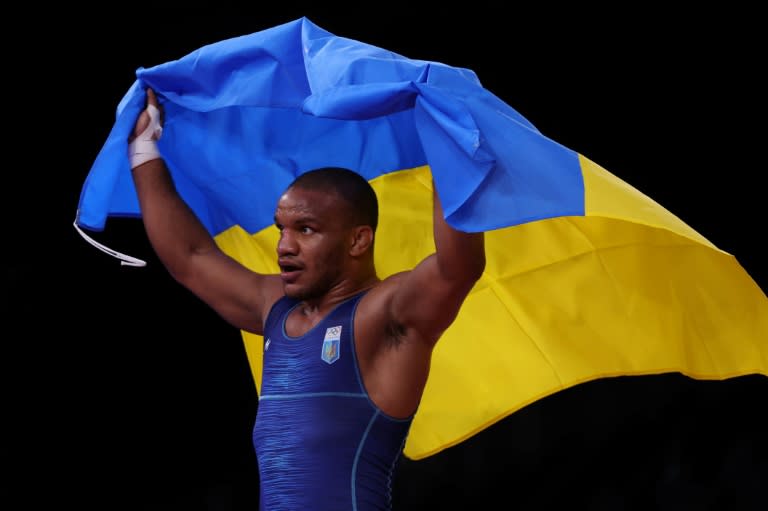Ukraine's Olympic hero Beleniuk hopes for Russia-free Games

Ukraine's sole Olympic champion from the Tokyo Games, Zhan Beleniuk, is looking forward to defending his Greco-Roman wrestling title in Paris but has told AFP he believes the Russians will stay away in protest at the IOC's hardened stance on their participation.
Russia invaded Ukraine in February 2022 and the war is still raging, having cost tens of thousands of lives and huge damage to the infrastructure of the country.
Beleniuk -- born in Ukraine to a Ukrainian mother and a Rwandan father -- welcomes the fact that the International Olympic Committee (IOC) eventually decided to take the tough action against the Russians that his compatriots had been calling for.
The IOC had been heavily criticised for refusing to ban the Russians and their Belarusian allies outright, instead saying they could compete as neutral athletes subject to certain conditions.
The Olympic body's tone has hardened of late, barring them from participating in the opening ceremony in Paris, which led to a furious reaction from Moscow last month.
Russian foreign ministry spokeswoman Maria Zakharova lashed out, saying the IOC had "slipped into racism and neo-Nazism".
While Russia's sports minister has said he is opposed to a boycott, Moscow is yet to make its final decision on its attendance at the Games.
Beleniuk, who in 2019 became the first black person to be elected to the Ukrainian parliament, said he believes Russians will eventually refuse to accept the conditions imposed on them by the IOC and stay away.
"I have read some articles citing Russian officials who are responsible for sports. They told the papers they were thinking about boycotting this competition (the Olympics) because of IOC's new conditions," Beleniuk told AFP from Ukraine.
"For us it is very good as we talked about that, that they could not compete in this kind of competition with us athletes who they are at war with."
He said the IOC had tried to find a "balance" by allowing Russians to compete as neutral athletes.
"Now we can see Russia have not agreed with this, like us, so the next step for Russian sports can be the boycott and that is good," he said.
- 'Terrible time' -
For Beleniuk it is not the first time his life has been affected by war.
When he was just three years old his father Vincent Ndagijimana, a pilot, was killed in the Rwandan genocide in 1994 after he returned home.
Beleniuk, a member of Ukrainian president Volodymyr Zelensky's party, said the invasion had sparked memories of his past nightmares.
"I thought about that," he said. "The reality of my life. My mother, my father, war, and thinking one only has this life.
"I grew up in Ukraine so it is a little bit difficult mentally to get your head around the history when you had a genocide with hundreds of thousands murdered only 30 years ago.
"This situation damages your mind every time you think about it."
Ndagijimana tried to be a moderating force but not only was he killed, several half siblings of Beleniuk were burned to death in their house.
Beleniuk paid a visit to his father's grave in 2017, a year after he won silver at the Rio Olympics, and met with relatives.
"My Rwandan relatives heard about some guy from Ukraine with Rwandan roots got a medal," he said.
"After that we had our first meeting as I came to Rwanda and met with my relatives.
"I showed my medal and I visited the president of NOC and minister of sports because Rwanda have not had a medal from Olympic Games.
"I am half Rwandan so I understand that some part of Rwanda as a country finally gets a medal at the Olympic Games."
Beleniuk does not compare the genocide to what the Russians are doing in Ukraine, but he does see similarities.
"It is very tough but our reality, our world," he said of the genocide.
"Now even in our time we can see how the Russian army do acts of terror in our country.
"Nowadays for us this terrible time continues but we try to do our best to survive and keep our state."
In common with many of his Ukrainian Olympic teammates, the conflict has affected his training.
However, it was a good omen that he was third in this year's European Championships -- the same result as before he won Olympic gold.
He does, though, believe that some good had come from the bad of the past two years.
"Our athletes are much stronger than two years ago, they have grown up by 10 years owing to the concern over their relatives security, their own safety and their future.
"They have become adult athletes."
pi/gj

 Yahoo Sport
Yahoo Sport 





































